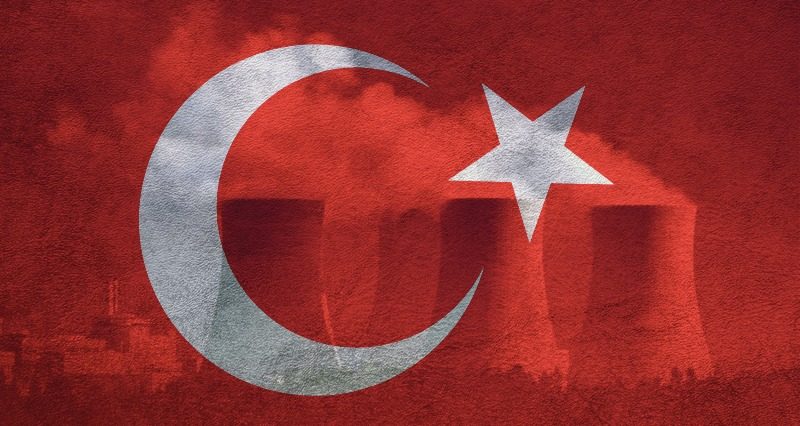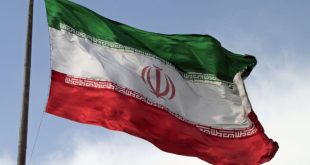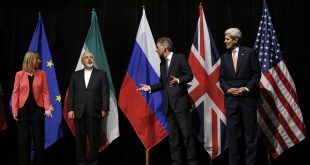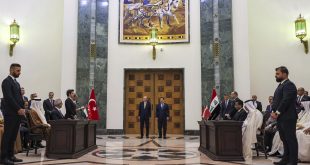The increasing use of energy in the contemporary international system has made the countries located along the transmission route more important. The effort to transform the way in which more and more energy, especially oil and natural gas is increasingly transmitted to economic interests, adds to the political and security capability of countries. Considering the importance of this, countries are now increasingly trying to exploit their geographical location as a means of power. Turkey has defined this geopolitical energy as a means to achieve its strategic goals in the region and in the international system. The proximity to the mainstream of energy production on the one hand and its proximity to the European Union as one of the most important energy consumers on the other have led Turkish leaders to consider pipeline diplomacy to pursue their foreign policy goals. Turkey’s appropriate geopolitics has increased its importance in the energy sector. In the present article, while referring to the framework of EU-Russia relations in the field of energy and the flexibility of the Union in the face of Russian politics, the opportunities created for Turkey in using the pipeline diplomacy in the Global Strategy are discussed.
Energy has had a positive role in expanding economic and political relations between Russia and Turkey. Russia supplies two-thirds of the gas needed by Turkey, accounting for 76% of Moscow’s exports to Ankara. In 1986, Turkey made an agreement to buy 6 billion cubic meters of natural gas from Russia for 25 years. A similar contract was signed for the purchase of 8 billion cubic meters of natural gas in 1998. In addition to bilateral energy purchase and sale contracts, the two countries have many plans to transfer Russian energy from Turkey to Europe. Accordingly, Russia and Turkey have a prominent role in the World Energy Map because of their significant fuel and energy reserves, and the maritime and land transportation corridors of the energy suppliers from the Caspian Sea, Central Asia and the Near East to European consumers.
Turkey looks to Russia for help in joining the Club of Nuclear States, as it has incurred huge costs for the purchase of military weapons from Russia. In these circumstances, it is expected that the next decade will witness a race among regional governments, which also strive to have nuclear facilities under different titles. Meanwhile, Saudi Arabia, which feels threatened by Iran, has also sided with the U.S. and the Trump administration in its nuclear program so as not to fall behind.
The fact is that the inactivity of Iran’s nuclear deal with the West, the rising tone of threat in Tehran, and Europe’s attempt to mediate between Iran and the United States have all led to a proliferation of nuclear programs here and there, especially given the severe chaos of the international system. Previously, the West’s concealment of Israeli nuclear facilities had raised concerns about a possible nuclear race in the Middle East, and the secret of Israel’s interest in nuclear Iran, which wants to be the only state in the region with nuclear weapons.
RUSSIA’S GEOPOLITICAL ENERGY AND POLICIES
Its international status is restored in the international system. According to Daniel Yergin, Russia’s goal is to Energy Policy, Increasing Control over Strategic Resources, Controlling Production Monopoly and Market Transition .Energy is dominating international markets, especially in the European Union market. Meanwhile, Russia’s energy policies have highly significant security implications for the Union.
TURKEY ENERGY HUB PLAN
By becoming the region’s energy transfer hub, Turkey can gain more benefits than the East and West corridors. In a situation where Turkey is the only corridor between the East and the West, this country can only benefit from the economic benefits gained from energy transfer. By becoming the energy center of the Turkish region, it can increase the amount of energy produced by enabling the seizure of trade in gas and natural gas. In such a situation, by balancing the east-west corridor and the north-south transit corridor, Turkey will avoid the negative effects of one of these trends (thus becoming the energy center for the greater Target region). Hence, the regional of this country need to seize opportunities.
AKKUYU NUCLEAR POWER PLANT
The relationship between Turkey and Russia is not just about purchase of gas and arms as well as the export of food and agricultural products from Turkey to Russia,. There is another important aspect in this relationship, which is the discussion of Russia’s establishment of a Turkish nuclear power plant.
The Akkuyu Turkey nuclear power plant is built with Russian scientific and engineering knowledge and skills. In addition, Turkish human resources have been sent to Russia to be trained to operate the power plant. For Turkey, this means moving towards independence. This is what has always been a vital concern for Ankara’s diplomacy and foreign policy. In other words, with the opening of the Turkish Stream gas pipeline project from Russia and Turkey’s use of Russian fuel, as well as Turkey’s benefit from Russian gas transit to Europe and the issue of nuclear power, it can be claimed that the cooperation between Turkey and Russia in the field of energy has reached a desirable and significant level.
Turkey’s needs in the field of energy diplomacy, as well as Russia’s influence on regional political equations, have led Erdogan and his team to work harder to strengthen ties with Russia than ever before. The construction of the Turkish Stream pipeline for Iran could be a “huge loss”, since Turkey, with Russian gas, is able to determine the rate of gas imported from Iran.
INCREASE IN TRADE VOLUME
Turkey and Russia are interested in increasing trade volume, This seems to be feasible, and It can bring our trade volume with Turkey to $100 billion a year. Both countries have a good potential to increase trade volume. Under the current circumstances, the $100-billion trade and economic exchanges between Turkey and Russia seem like a grand dream and an exaggerated one. To achieve the $100-billion dream, Turkey and Russia need to work together in many areas and provide some of their supplies to each other’s markets. However, it seems slightly difficult to reach such a frontier. Yet, in any case, the will and decision of Erdogan and Putin to move in that direction can be justified in light of Donald Trump’s unrelenting rigidities in customs policy.
ERDOGAN: TURKEY’S ACK OF NUCLEAR WEAPONS IS “UNACCEPTABLE”
Plans to use nuclear power in Turkey’s neighboring countries and the existence of nuclear competition among some Middle Eastern countries have raised concerns among Turkish officials. Saudi Arabia has launched its nuclear program receiving US government support and utilizing Western technology. Iran has long had its own nuclear program. Israel also has a nuclear weapon. In the field of international relations, the principle of the balance of power is of interest to all governments, and governments are working toward increasing their investment in defense to ensure their security against their neighbors and major powers. Thus, Turkey’s bid to buy Russia’s missile defense system and Erdogan’s recent remarks that it is an “unacceptable” situation that Turkey is in no possession of nuclear weapons can be assessed in this regard.
Despite its timelessness, the regions’ nuclear domino theory is not easily ignored. For those who advocate a pre-emptive military strike against Iran, such a theory is a geopolitical rationale for a devastating military operation. Saudi Arabia’s remarks about the prospect of nuclear competition with Iran not only raised Western observers’ concerns, but even prevented Israel from concealing its dissatisfaction based on the prospect of entry into the country and possibly other countries in the region.
The sharpening of the strategic divide between Turkey and the U.S. during Erdogan’s leadership could, in the long run, persuasively lead the country toward making a decision to acquire a nuclear weapon. This may not be the actual case at the present time, but Erdogan’s important and deliberate remarks as a possible scenario in a world which is increasingly moving toward an increased nuclear-weapons competition will remain in the minds of many observers for an extended period of time. The Turkish president also stressed that Israel, which is located close to the Turkish border, has nuclear missiles, which is a source of concern. Erdogan’s discontentment has also caused discontent among some Western and US governments.
With the exception of Israel and Iran, there has been no report of another country trying to acquire nuclear technology in the Middle East, but last month the House Oversight Committee, which has a majority in the Democratic Party, have revealed that the government has tried to provide Saudi Arabia with advanced nuclear technology without taking into consideration legal and security issues.
The agreement for the Akkuyu Nuclear Plant was signed between the governments in the year 2010. The first unit of the Plant is planned to be put into use in 2023. On the other hand, the other units are planned to be put into use with one-year intervals. Thus, the target is to pass on to a full capacity production of the Plant consisting of four reactors, each of which has a capacity of 200MW, in the year 2026. However, the developments experienced are raising discussions on the fact that the date of the Plant’s date of operation could be extended.
A primary issue of criticism regarding the project is that with the Akkuyu project, dependence on Russia in terms of energy will increase. At present, Russia is the greatest supplier of natural gas and the third greatest supplier of oil to Turkey. Turkey needs to not only diversify its energy sources but also increase the number of countries from which it imports energy. Rather than ensuring long-term energy security, the energy policies of the present government of Turkey, especially those followed since the year 2010, are not putting energy security at risk by designing them in favor of certain companies.
The government is planning to decrease the ratio of natural gas in electricity production below 30%. According to the prepared scenarios, the Akkuyu power plant alone will be able to meet a maximum of 7.7% of Turkey’s electricity production in 2026. Personally, I am not against nuclear energy that is secure and has advanced technology. However, I am in favor of such a project being launched in a nation where democracy is developed or at least developing and where questioning can freely be exercised. Otherwise, the costs of nuclear power plant projects which media organs cannot question or whose tenders are not transparent can be much higher than their gains.
An important part of the expansion of relations between the two countries has been due to geopolitical requirements and cooperation in the field of energy. As energy plays an increasingly important role in both countries’ foreign policies and national security, it has a major impact on Russian-Turkish relations. The issue of energy security has led Russia and Turkey to work together to resolve regional disputes, and the Western factor has less of an impact on Turkish-Russian relations than it did in the past since factors such as the orientation of the ruling elite and state bureaucracy in both countries have played a positive role in expanding the two countries’ relations. For this reason, the prospects for bilateral cooperation depend heavily on the dynamics of political development, the ruling elite and the bureaucrats of the two countries. Thus, in the current situation, the two countries appear to move towards establishing interdependence based on common goals while maintaining and expanding high-level bilateral relations.
Geopolitical positioning and being in a particular area are among the factors that influence how countries define a grand strategy. However, geopolitics alone is not limited to the physical state of the country; it can be defined in terms of resource allocation or in terms of the path of energy transfer to pursue macro-asset goals. Turkey is in the midst of a global energy transition and is therefore trying to use this opportunity to pursue its big goals. Turkey’s leaders are using their geopolitical position to establish order in the Middle East, Central Asia, and the Caucasus, as well as to influence the EU’s regional development. Turkey’s new strategy focuses on security and three independent and multipolar stability policies by playing a more active role in providing order in the aging region. Turkey is seeking to establish itself as a regional law by pursuing this policy. The geopolitical energy factor is one of the most important tool for Turkey in pursuing this policy.
Turkey needs to use more renewable and nuclear energy to reduce dependency on fossil fuels. Russia’s nuclear technology could help Turkey to use nuclear energy to generate electricity and may be help Turkey to develop its own nuclear program.
Turkey and Russia have mutual interest in some regional crises and issues. From the Eurasian perspective, energy relations would help Russia ad Turkey to follow the same policy in the region, but it should be noted that in some cases they would have different interests. The Akkuyu nuclear power plant would have a strategic importance for Turkey and Russia as well. Russia would have a chance to sell more nuclear power plants to other countries after completing the Akkuyu power plant. Regional cooperation needs interdependency in bilateral relations, and Turkey needs to export more goods to Russia if the Turkish government wants to be more dependent on Russia’s energy resources. Trade volume has been in favor of Russia for many years, and according to the interdependency theory in international relations, Turkey must try to create a balance in trade volume with Russia.With more electricity generation via renewable and nuclear energy sources and by taking into consideration energy efficiency, Turkey could have a chance to be an electricity exporter at mid-term, and may play a role in Eurasia energy security. Foreign investment provides investors with a chance to have an impact on the country’s foreign policy. The Akkuyu project is vital for Turkey’s future energy plan. More electricity generation from renewable and nuclear energy could help Turkey to reduce dependency on fossil fuels and Turkey could possibly reexport fossil fuel to other countries and get gain more benefit and increase more geopolitical importance in the regional energy sector.
https://uwidata.com





